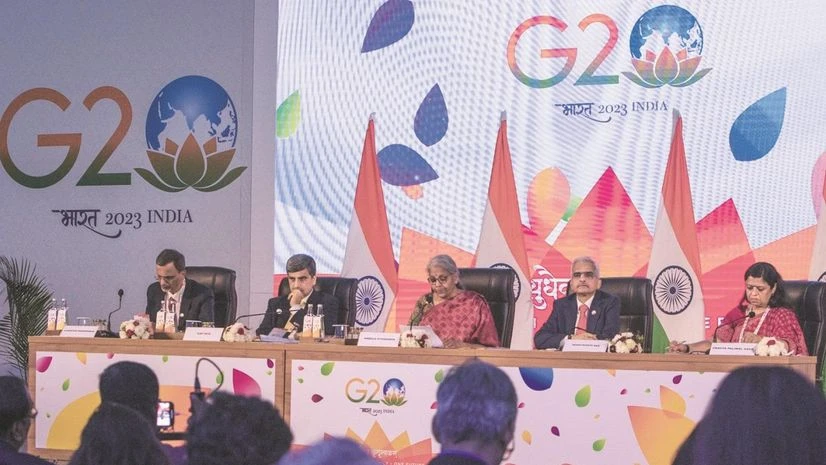Strengthening the multilateral development banks (MDBs), blended sustainable finance to encourage private investment and financial inclusion are among the big issues that finance ministers, central bank governors and policy experts would be negotiating during the upcoming G20 finance track meeting in Gandhinagar between July 14 and 18.
As India gears up to host the third finance track meeting, a draft communique has been prepared by the finance ministry, listing out various issues on which consensus of the G20 members would have to be drawn.
The third finance track meeting is the last one, before the leaders’ summit to be held in New Delhi in September. One of the key items on the agenda would be the report by the G20 expert group on an updated MDB ecosystem for the 21st century. The nine-member expert group, led by 15th Finance Commission chairperson NK Singh and former US treasury secretary Lawrence Summers, has submitted its first report to the Department of Economic Affairs in the finance ministry.
Also Read
“The meeting has the advantage of the report by a group of experts who are distinguished. Let us hope we get some substantive results,” said Montek Singh Ahluwalia, former deputy chairman of the Planning Commission.
On the issue of strengthening MDBs, a policy expert said that G20 has evolved over many years, at times making statements without commitment. “Whether what they say constitutes meaningful direction to banks or pushes the can further down the road would be important.”
The challenges around MDB’s evolution that will be discussed during the upcoming meeting include incentive structure, operational approaches and financial capacity so that they are better equipped to finance a wide range of sustainable development goals and trans-boundary challenges such as climate change and health.
So far, there have been two meetings of the finance ministers and the central bank governors — one in Bengaluru and the other in Washington DC. The last meeting in Washington saw participation of around 350 delegates from G20 members, 13 invitee countries, and several international and regional organisations.
The priority principles of the meet are expected to be endorsed by the bloc’s finance ministers and central bank governors in the Gandhinagar meet this month.
While no communique has been issued so far, a detailed G20 chair’s summary after the first G20 Finance Ministers and Central Bank Governors meeting in Bengaluru from February 24 to 25, laid out the outcomes of the discussions.
India, as G20 President, was aiming for a communique, which is a stronger statement of intent. However, there could be no agreement on the issue since Russia and China were opposed to the language of condemnation of the former’s invasion of Ukraine.
“At the moment, the finance ministers have some issues to resolve. The present travails are larger on account of the Ukraine war. Finance ministers cannot resolve these. If at all, they have to be addressed at the summit level. Lot of preparatory work has to be done before that,” former finance minister Yashwant Sinha, who was involved in some key G20 meets earlier, said.
Some of the other issues that would be discussed by the bloc include infrastructure development, regulations of cryptocurrency and global health in the post pandemic world.
Policy experts, however, said that several issues such as climate finance, infrastructure developments would circle back to funding by MDBs.
“There has been demand from developing countries that the developed countries should help financially but they are not loosening their purse strings. Don’t think any revolutionary achievements will be possible,” Sinha added.
However, the meetings have had some successes as well including a common position on the debt language. Finance Minister Nirmala Sitharaman had said earlier, “I was glad a common position has arrived on this language. It is important for us to emphasise because vulnerable countries are looking at G20 to find some solution to relieve their debt distress. Many have been waiting for a very long time. G20 is now standing up to meet the challenges of debt distress.”
Members have also agreed upon the financial challenges posed by the crypto-assets ecosystem. In the second FMCBG meeting, members had discussed potential global policy responses to crypto-assets, taking into account the risks, especially to emerging markets and developing economies.
“There is almost a clear understanding that anything not issued by a central bank is not a currency. And this is a position that India has been taking for a very long time and we are glad that such a position of India is now getting acknowledgment from many different members,” the FM had said.
The outcomes of the third finance track meeting will inform the discussions of the leaders’ summit to be held in September.

)
